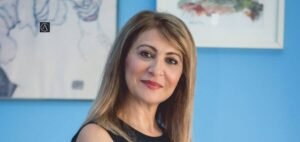Fostering Innovation and Excellence in Higher Education!
In the environment of higher education, the intersection of digitalization, future skills and sustainability has emerged as fundamental forces shaping the educational paradigm. These trends are not just transformative but essential for preparing students to thrive in a developing global context. Embracing these challenges and opportunities is Prof. Dima Jamali, a seasoned academic leader with over two decades of experience. Her journey in academia has been marked by a commitment to innovation and excellence, guided by a vision to elevate educational standards and foster impactful change.
As the Vice President of Academic Affairs at Canadian University Dubai, Dima spearheads initiatives aimed at advancing academic rigor and preparing students for success in the digital age. Under her leadership, the university has embraced cutting-edge teaching methodologies and integrated sustainability across its core excellence agenda. This strategic approach not only enhances educational outcomes but also ensures graduates are equipped with the critical skills demanded by today’s employers.
Canadian University Dubai stands out as a beacon of innovation and academic excellence under Dima’s stewardship. By prioritizing research leadership in AI & Business Analytics, Innovation, Entrepreneurship and Sustainability, she underscores the institution’s commitment to shaping future leaders and driving societal impact. Through strategic partnerships and forward-thinking initiatives, she continues to position it at the forefront of global higher education, paving the way for a more sustainable and inclusive future.
Let’s delve into Dima’s significant journey:
Embracing Digitalization, Future Skills and Sustainability
Dima, an accomplished higher education leader, has observed a significant evolution in the academic environment. The transformation is chiefly driven by three interlinked forces: AI and digital transformation, the growing demand for future-ready skills and the imperative of sustainability. These trends align closely with global insights from organizations such as the OECD, Accenture and the World Economic Forum, underscoring their critical relevance to the future of education.
- The Digitalization of Learning:
The advent of online learning and advanced technologies like AI has not merely altered educational practices technologically but also pedagogically. At Canadian University Dubai (CUD), Dima champions a commitment to “teaching innovations” by integrating simulations, interactive case studies and extracurricular activities such as competitions and hackathons. The institution has prioritized faculty development to ensure educators effectively leverage digital tools. This strategic shift towards digitalization resonates with the OECD’s advocacy for technology-enhanced learning and the World Economic Forum’s focus on preparing learners for the digital era.
- Cultivating Future-Ready Skills:
With rapid technological advancements and global economic shifts, higher education must equip students with essential 21st-century skills. Beyond traditional knowledge domains, these skills encompass critical thinking, creativity, collaboration and digital literacy. At CUD, curricula have been redesigned to embed and track these competencies across general education and specialized programs. Project based learning, interdisciplinary collaboration and experiential opportunities further nurture these skills. This educational focus aligns with Accenture’s research on human skills in the digital age and the World Economic Forum’s advocacy for lifelong learning and adaptability.
- Embracing Sustainability:
Sustainability principles are integral to CUD’s ethos, influencing research, teaching and institutional values. A forthcoming sustainability center aims to forge industry partnerships and pioneer forward-thinking solutions. Collaborative research initiatives, such as partnerships with the University of Oxford on AI and sustainability, underscore CUD’s commitment to advancing sustainable development. Sustainability themes are integrated comprehensively across all academic programs, reflecting a commitment beyond trends to fundamental educational transformation.
These trends—digitalization, future-ready skills and sustainability—are interconnected and mutually reinforcing, shaping the future of higher education. Dima emphasizes that by embracing these transformative trends, universities can enhance relevance, responsiveness and impact. As a thought leader in the field, she believes universities possess a unique opportunity to drive positive change for students and society by remaining adaptable to global governmental and industry shifts.
Advancing Excellence through Innovation and Global Partnerships
As Vice President of Academic Affairs at Canadian University Dubai, the overarching vision is to establish the institution as a global leader in higher education, promoting innovation, entrepreneurship and positive societal impact. This entails advancing academic excellence through rigorous programs, fostering research leadership in AI & Business Analytics, Innovation, Entrepreneurship and Sustainability and integrating these themes into both curricular and extracurricular activities.
- Elevating Academic Excellence:
The focus is on cultivating a culture of intellectual rigor and curiosity, challenging students to achieve their highest potential. This involves enhancing existing programs, launching high-demand degrees aligned with global market needs and attracting distinguished faculty who are leaders in their fields.
- Nurturing Research Excellence:
Canadian University Dubai aims to become a prominent research hub in the region, particularly in AI & Business Analytics, Innovation, Entrepreneurship and Sustainability. This commitment includes investment in cutting-edge research facilities, recruitment of top-tier researchers and fostering interdisciplinary collaboration to address complex global challenges. The university aims for research that is rigorous, relevant and impactful, contributing significantly to knowledge advancement and societal improvement.
- Promoting Program and Teaching Innovation:
Innovation is viewed as essential for higher education evolution. Continuous exploration of innovative pedagogical approaches, utilization of technology to enhance learning experiences, and cultivation of a culture that encourages creativity and experimentation are priorities. Faculty are encouraged to integrate cutting-edge research into teaching, create experiential learning opportunities and develop programs that meet evolving job market demands, ensuring graduates are well-prepared with sought-after skills and knowledge.
- Building World-Renowned Strategic Partnerships:
A strategic initiative involves cultivating strong partnerships with leading academic institutions and industry partners worldwide. These collaborations offer students opportunities for international exchange, collaborative research projects and career development.
Through established ties with Canadian universities, seamless transfer pathways are provided for students seeking to complete their degrees in Canada. Leveraging these partnerships expands global reach, enriches academic offerings and enhances the international educational experience for students at Canadian University Dubai.
Award-Winning Commitment to Academic Excellence
Dima received the National Council for Scientific Research Award, a significant national honor in Lebanon, alongside the Aspen Institute Faculty Pioneer Award, a prestigious international recognition. These accolades underscored her dedication to academic excellence and affirmed her commitment to advancing knowledge, mentoring colleagues and fostering an environment conducive to the growth of faculty and students alike.
Urgent Imperatives in Sustainability
The paramount challenge facing sustainability today is the imperative to accelerate climate ambition. The escalating climate crisis demands a paradigm shift from incremental adjustments to transformative solutions that decarbonize economies, safeguard biodiversity and ensure equitable transitions. Addressing this challenge requires not only technological and policy innovations but also a unified sense of urgency to galvanize action across individuals, businesses and governments. Education plays a crucial role in cultivating a new generation of conscientious leaders and innovators capable of driving sustainable change.
Sustainability and CSR Integration
The future of higher education hinges on its response to contemporary challenges, placing sustainability and corporate social responsibility (CSR) as central pillars. Dima envisions a transformative shift where these principles are deeply ingrained in core curricula and institutional strategies, not as peripheral topics but as integral components.
Sustainability will permeate every academic discipline, fostering a comprehensive understanding of its impact across business, society and the environment. Students will actively participate in practical projects addressing real world issues, developing the skills necessary to drive meaningful change in the future.
CSR will be elevated from a secondary concern to a core business priority within educational frameworks. Institutions will empower students with the expertise to navigate the intricate landscape of Environmental, Social and Governance (ESG) considerations, preparing them to lead organizations that prioritize ethical practices alongside profitability. The integration of sustainability and CSR into higher education aims not only to produce graduates capable of tackling global challenges but also to cultivate a new generation of leaders committed to forging a fairer and more sustainable world.
A tangible example of this commitment is demonstrated through recent collaborations such as the “Summer Entrepreneurship Program” with Berkley, which integrates sustainability throughout the student journey—from ideation and incubation to the creation of innovative, disruptive business solutions. This approach underscores the imperative for universities to embrace their responsibility in shaping a future aligned with sustainable development goals.
Navigating Sustainability and CSR Trends
Staying current with the developing environment of sustainability and CSR demands a comprehensive approach. Dima remains actively engaged in leading-edge research and collaborates closely with renowned experts, ensuring she remains at the forefront of emerging trends and developments. Her participation in prominent international conferences and workshops, such as those organized by the United Nations Global Compact, the annual SDG Leaders’ Summit in New York City and the UN Climate Change Conference (COP), facilitates meaningful engagement with peers and practitioners. These forums serve as platforms for exchanging ideas, insights and the latest research findings and best practices.
Dima maintains a curated collection of academic journals, industry publications and newsletters from esteemed organizations like the World Business Council for Sustainable Development (WBCSD), The Economist Intelligence Unit and Harvard Business Review. This curated information keeps her informed about emerging trends, cutting-edge research and leading practices within the field.
Moreover, she cultivates a robust network of like-minded professionals across academia, industry and civil society. These connections provide diverse perspectives, inspire innovative ideas and foster collaborative research efforts and initiatives aimed at advancing the realms of sustainability and CSR.
Leadership and Inspiration in Academia
Being recognized among the top 2% of scientists and researchers worldwide is both a privilege and a significant responsibility. Dima views this acknowledgment as an opportunity for thought leadership and a platform to inspire emerging academic talents. Embracing this role, she aims to serve as a role model and share her passion and work ethic with a broader audience.
Balancing Professional and Personal Well-being
Dima prioritizes her well-being by maintaining clear boundaries between work and personal life, allocating specific time for exercise, hobbies and spending time with loved ones. Delegation and collaboration within her team enable efficiency, allowing her to recharge and concentrate on strategic objectives.
She finds that a healthy work-life balance not only enriches her personal life but also enhances her creativity and effectiveness in her professional responsibilities. Despite occasional challenges, she remains committed to restoring and sustaining this equilibrium to maintain a positive mindset.
Advice for Aspiring Academics and Researchers
Dima offers advice to aspiring academics and researchers: pursue your passions with determination, commit to lifelong learning, cultivate robust professional networks and actively seek collaborative opportunities to effect meaningful change. Emphasizing resilience, she underscores that setbacks are integral to personal growth and development. She encourages seizing opportunities as they arise, believing in the transformative potential of innovative ideas. Lastly, she advocates for kindness and mentorship, urging individuals to empower the next generation of scholars and leaders.
Professional and Personal Goals
Dima’s professional objective is to enhance academic excellence at CUD while striving to profoundly impact the lives of students. Personally, her goal is to nurture relationships with authentic individuals, continually grow and develop while adhering to her values and maintain inner peace.




